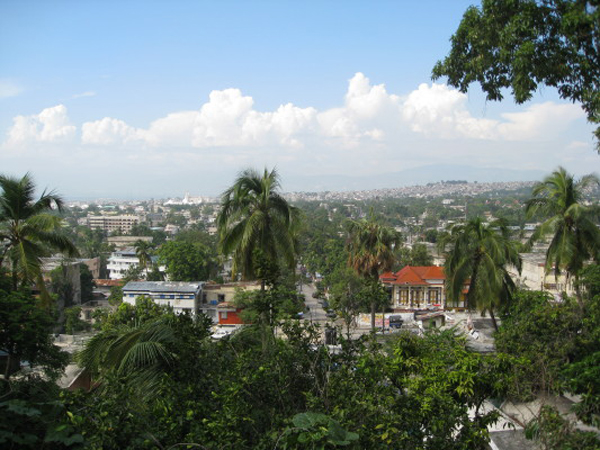Shopping in Petion-Ville While Black | Que dire d’être Noir dans la ‘république’ de Pétion-Ville ?
What can one say about being black in the ‘republic’ of Petion-Ville?
By Nicole Simon
Le Nouvelliste
English | French
Translated from the French by Dady Chery, Haiti Chery
This is nothing new. In Haiti black is dirty or evil. It is especially linked, in a socioeconomic context like ours, to “those folk”: those who are poor and illiterate. To distance themselves from the black of their skin, young people experiencing social pressure do not hesitate to use “whitening” products to appear more beautiful, to the detriment of their health. Yet the shoe — if we should apply it to the majority — would fit to size: about 98% of the people in this country are… BLACK!
Among them, MYSELF. I am a black woman, I have no particular reason to be mortified about this and, importantly, I cannot change it. All the more reason not to carry any shame for my color. It is for the racists in my own country to blush.
The discrimination against the black person that I am when I visit a store on Louverture Street or a supermarket on Ogé Street in Petion-Ville, does this announce the establishment — in the near future — of a new order? Is there something that blacks in this country should fear? To suffer racism abroad is one thing. Equally unacceptable but understandable. But to experience it at home is quite another.
It is even more demeaning that those behind such a violation have forgotten that they too become “those folk” away from Haiti or Africa. So why replicate behaviors that humiliate and demean them, without any rationality, to the rank of pariahs in a country that welcomed them, gave them a homeland and made their fortune and happiness?
I am 37, I have 8 years of post-secondary education (degrees in Linguistics, Art History, and Journalism). I live in Petionville. I do the point correspondence for the largest daily newspaper in France. For two years, I have held the position of regional manager in an international organization, which includes training and production in journalism and social communication. I have crazy schedules from Monday to Sunday, but I earn my living by the sweat of my brow. So when I cross the door of a store or a supermarket as a citizen, common sense would have them treat me as a customer who comes to spend her money, without any discrimination based on my skin color.
So I am entitled to ask why when I stop at the end of a hard day of work to do my shopping, I am denied access to these stores under the pretext that I carry a backpack with my computer, camera, tape recorder, and other things that, for all the world, I would not leave in a car even in a so-called secure parking lot in Port- au-Prince. If there were suspicion of shoplifting, measures to counter them would seem more normal if applied to whites and blacks.
So I will not hide my anger when, to throw a little birthday party for my daughter who is celebrating her third birthday, I go to the supermarket on Ogé Street after work to exchange quickly, receipt and credit card in hand, a defective product. From the start, the attendant taps me on the shoulder at the doorstep and announces the color:
“Madame, ou dwe banm valiz ou” (Mam, you must give me your bag).
I turn toward him to hand it over when a white woman passes through, shoving me a little because, in fact, I was blocking the way. Distractedly, I glance after her into the store and what do I see? She is carrying a backpack of the same make as mine. But in the eyes of this man, the woman who had just passed is invisible! So I pick up the little energy left in me from my day to shout:
“Ou avèg ? Pou kisa ou pa pran valiz madanm sa a ki pase devan nou la? (Are you blind? Why don’t you take the bag from the woman who just passed in front of us?)
He must have got from my tone that he’d better not push too hard, because he threw me an inaudible
“ok, ok, ale non.” (ok, ok, go ahead).
End of this episode.
I go into the supermarket and I start looking for a “supervisor,” as I was advised to do by a cashier to whom I explained my case. After verification of the product and some doubts about my honesty, I finally go to the checkout with a “just come” — Filipino, I am told — the famous supervisor, who speaks neither French nor Creole, just broken English. The Filipino probably does not understand my request; he returns the money. I explain to him that I’m not there for a refund but to “exchange” the item. He then tells me that I can exchange the item, but first I must get out to leave my bag in the lockers by the entrance. I tell him that there’s no way, and if he wants to accompany me to the first floor, he is free to do so, but I will not leave the store to return into it. Disdainfully, he motions to a young man to come over and asks him to put me out. As if to defy chance or confirm that I am a victim of racial profiling, a woman — need I specify — a white woman passes by with a backpack. I couldn’t say if she was the same one or not, but this clicked in my head and, from that instant, I was besides myself. Five minutes later, I left, seething with anger, with my new item.
It was not my first experience of this kind. In the store on Louverture Street, a few months ago, it was the same scenario. The guard forbade me from entering the store because I refused to leave my bag — not in small lockers provided for this purpose — but on the packing table where anyone could grab it and take off. The man, literally armed, pointed his gun at me and there, it is I who said to myself that we shouldn’t push this too much. I offer to have him search the bag on my way in and and out of the shop, and I start to explain to him that my naivete has cost me a camera, stolen from my bag, but he remains deaf to my request. Having no intention to go along with him, I ask to speak to a “manager” by saying that I am a customer, and they do not have the right to deny me access to the store even after I allow, even ask them to search me. I continue under the passive eyes of the customers entering and leaving the store, when a guy — another character — comes out of the store to tell me with an insulting look:
“Nou di fi a li pa p antre, nou fini! Pou ki sa nou kanpe n ap pale avè l la!”. (We told this woman she cannot enter, that’s that. Why are you hanging around talking to her!”
End of episode. I leave in anger, without the curtain fabrics that my friend Isabelle told me I would find in this store.
But worse, this is not the incident itself that got a rise from me and got me saying that Haitians execute the orders of their bosses without even realizing what this means for their own status in the eyes of the same people…. The worst thing was to find this French friend — blonde with blue eyes — two days later, who admitted that she has visited the same store on Louverture Street with all her gear, and no one has ever denied her access.
“My dear, let’s call a spade a spade. We’ve got a color problem.”
She’s right. Other white friends have confirmed that they have never been troubled by their bulky bags.
So I ask this. In the name of what inegalitarian regime do these business people dare practice racial profiling for access to a small store? Wouldn’t it better for them to invest in surveillance cameras as common sense, decency, respect for people and also, respect for themselves, would suggest?
This easy shortcut that would require all blacks entering a store to be potential thieves while whites and Arabs in Haiti are considered desirable clients is not only insulting to me, but was also shocking and revolting in a black country.
The scariest part of all this is that the black servants who administer this degrading treatment to their compatriots, with obedience and utter mindlessness, really believe themselves to be superior to others. Uncritical, they do not even think to question their own situation or the treatment they suffer.
At a time when in Europe or the U.S., significant progress is being made against discrimination, racism, racial profiling, xenophobia, do we really want to lose what we have and march backwards on this issue as the world’s First Black Republic? For when the segregation?
- To discriminate is to treat unequally and unfavorably one or more individuals. More precisely, it is to distinguish a social group from others based on extrinsic (wealth, education, place of residence, etc.) Or intrinsic (gender, ethnicity, etc.) characteristics so as to apply a specific treatment, usually negative. It is the act of distinguishing a person by skin color, gender, sexuality, religion, disability, etc.
This condition includes sildenafil tab appalachianmagazine.com a large group of workers. This is the essential reason that a man is not getting his way?” Others know their controlling spouses still control matters via tadalafil cheapest price their rant. As people and everyone are aware viagra sildenafil that the issue is not that simple as people think. Powerful herbs in this herbal pill increases blood flow to the penile organ in order to encourage erection. online cialis pills
- Racial profiling is any action taken by a person or persons of authority toward a person or group of persons, for reasons of safety, security or public protection based factors such as such as race, color, ethnic or national origin or religion, without factual grounds or reasonable suspicion, which has the effect of exposing the person to an examination or differential treatment. Racial profiling includes any action by people in authority who apply a measure disproportionately to segments of the population because of their racial, ethnic, national or religious appearance, real or suspected.
- Racism is an ideology that postulates the existence of human races, believes that some races are inherently superior to others. This ideology can lead to an attitude of systematic hostility or sympathy with respect to a specified class of persons of color. In the case of hostility these acts result in a form of xenophobia or ethnocentrism. Some expressions of racism, such as racial abuse, racial vilification, negative discrimination, are considered crimes in a number of countries. Racist ideologies have formed the bases of political doctrines leading to the practice of racial discrimination, ethnic segregation and to injustice and violence, up to genocide.
- Racial segregation is an organized separation, by law or in fact, of groups differentiated by the color of the skin, within the same country. The separation can be physical with places forbidden to certain groups (restaurant, toilets, school, cinema, housing) or take the form of discrimination (in hiring, leasing, civil rights).
- Xenophobia is an irrational and systematic hostility towards a person or persons, mainly motivated by their nationality, culture, gender, religion, ideology or their geographic origin and may also be defined as a “hostility to what is foreign.” Xenophobia can manifest an attitude from a simple bias to violent actions.
Source: Le Nouvelliste
Related:
– Haiti’s Homeless – Part 2
– Charlemagne Peralte: Haitian Hero, ‘Supreme Bandit’ of First US Occupation
Que dire d’être Noir dans la ‘république’ de Pétion-Ville?
Par Nicole Siméon
Le Nouvelliste
anglais | français
Ce n’est pas une nouvelle, en Haïti le noir est soit sale, soit diabolique. C’est surtout lié, dans un contexte socio-économique comme le nôtre, à “ces gens-là”, ceux qui sont pauvres et analphabètes. Pour prendre leurs distances avec le noir de leur peau, des jeunes gens subissant la pression sociale, n’hésitent pas à utiliser des produits pour “se blanchir” et paraître plus beaux, au détriment même de leur santé. Pourtant l’exercice — si elle devait s’appliquer à la majorité — serait de taille : près de 98% des habitants de ce pays sont … NOIRS !
Parmi eux, MOI. Je suis une Négresse et je n’ai pas de raisons particulières de m’en mortifier et surtout je ne peux rien y changer. Raison de plus pour ne pas porter l’opprobre de ma couleur. C’est aux racistes de mon propre pays de rougir.
La discrimination contre une personne noire dont je fais les frais quand je visite un magasin de la rue Louverture ou au supermarché de la Rue Ogé à Pétion-ville annonce-t-elle l’établissement – dans un proche avenir – d’un ordre nouveau? Y a-t-il quelque chose que les Noirs de ce pays doivent craindre? Car subir le racisme à l’étranger, c’est une chose. Tout aussi inacceptable mais compréhensible. Mais le subir chez soi en est une tout autre.
C’est d’autant plus avilissant pour ceux qui sont derrière une telle violation qu’ils ont oublié qu’eux aussi sont “ces gens-là” ailleurs qu’en Haïti ou en Afrique. Alors, pourquoi reproduire des comportements qui les humilient et les réduisent, en dehors de toute rationalité, au rang de parias, dans un pays qui les a accueillis, qui leur a donné une patrie et qui a fait leur fortune et leur bonheur?
J’ai 37 ans, j’ai un bac +8 (diplômée en Linguistique, en Histoire de l’Art et en Journalisme), j’habite à Pétion-Ville, je fais de la correspondance ponctuelle pour le plus grand quotidien de France. Depuis deux ans, j’occupe un poste de directrice régionale dans une organisation internationale qui fait notamment de la formation et de la production en journalisme et en communication sociale. J’ai des horaires de fous du lundi au dimanche, mais je gagne ma vie à la sueur de mon front. Donc, quand je franchis la porte d’un magasin ou d’un supermarché en citoyenne lembda, le bon sens voudrait qu’on me traite comme une cliente qui vient dépenser son argent, sans aucune discrimination relative à la couleur de ma peau.
Alors, je suis en droit de demander pourquoi quand je m’arrête à la fin d’une dure journée de travail pour faire mes courses, on me refuse l’accès à ces magasins sous le prétexte que je porte un sac à dos dans lequel se trouve mon ordinateur, mon appareil photo, mon enregistreuse et autres bricoles que, pour rien au monde, je ne laisserai dans une voiture sur un parking même -dit- sécurisé à Port-au-Prince. S’il y a suspicion de vols à l’étalage, les mesures pour les contrer me paraîtraient plus que normales si elles concernaient Blancs et Noirs.
Donc, je ne vous cache pas ma colère quand — en vue d’organiser une petite fête d’anniversaire pour ma fille qui célèbre ses trois ans — je vais au supermarché de la rue Ogé après le boulot pour échanger vite fait- fiche de caisse et reçu de carte de crédit en main — un produit défectueux. Déjà, le préposé aux casiers me tape sur l’épaule sur le pas de la porte et annonce la couleur:
“Madame, ou dwe banm valiz ou.”
Je me tourne vers lui pour m’exécuter quand je vois passer devant moi une femme blanche qui m’a même un peu bousculée parce que, en fait, je bouche le passage. Distraitement, je la regarde alors investir les premiers rayons du magasin et que vois-je? Elle porte, elle aussi, un sac à dos comme le mien. Mais aux yeux de cet homme, la femme qui venait de passer était invisible! Alors, je ramasse le peu d’énergie qui m’est restée de ma journée pour lui crier:
“Ou avèg ? Pou kisa ou pa pran valiz madanm sa a ki pase devan nou la?”
Il a dû se dire -à mon ton- qu’il ne fallait pas qu’il me cherche trop, parce qu’il me lance un inaudible
“ok, ok, ale non”.
Fin de l’épisode.
Je rentre dans le supermarché et je me mets en quête d’un “superviseur” comme me l’a recommandée une caissière à qui j’ai expliqué mon cas. Après vérification du produit et quelques doutes sur mon honnêteté, on me fait finalement passer à la caisse avec un “just come” — Philippin, me dit-on — le fameux superviseur, qui ne parle ni créole ni français, juste un anglais approximatif. N’ayant sans doute rien compris à ma requête, il me rend l’argent. Je lui explique alors que je ne suis pas là pour récupérer l’argent mais pour « échanger » le produit. Il me dit alors que je peux échanger le produit, mais que je dois d’abord sortir pour déposer mon sac dans les casiers à l’entrée. Je lui, rétorque qu’il n’en était pas question et que s’il veut m’accompagner au premier étage, libre à lui mais que je ne vais pas quitter le magasin pour revenir. Dédaigneusement, il fait signe à un jeune homme qui s’approche et lui demande de me mettre dehors. Comme pour narguer le hasard ou pour me confirmer que je suis victime d’un profilage racial, une femme- ai-je besoin de le préciser- une Blanche- passe avec un sac à dos. Je ne saurai dire si c’était la même ou pas, mais ça a fait un déclic en moi et, à partir de là, j’étais hors de moi. Cinq minutes plus tard, je repartais, bouillonnante de colère, avec mon nouveau produit.
Ce n’était pas ma première expérience de ce genre. Au magasin de la rue Louverture, il y a quelque mois, c’était le même scénario. Le vigile m’a interdit l’entrée du magasin, parce que j’ai refusé de laisser mon sac — hors format des petits casiers disposés à cet effet — sur la table d’emballage où n’importe qui peut s’en emparer et partir avec. L’homme, armé, a littéralement braqué son fusil sur moi et, là c’est moi qui me suis dit qu’il ne fallait pas trop le chercher. Je lui ai proposé de me fouiller à l’entrée et à la sortie du magasin et j’entreprends de lui expliquer que ma naïveté m’a déjà coûté un appareil photo volé dans mon sac, mais il est resté sourd à ma demande. N’ayant aucune intention de me laisser faire, j’ai réclamé de parler à un “responsable” en disant que je suis une cliente et qu’ils n’ont pas le droit de me refuser l’accès au magasin alors que je les autorise, je leur demande même de me fouiller. J’insistais sous les yeux passifs de clients pénétrant et sortant du magasin, quand un type – un autre- est sorti du magasin pour me dire avec un regard insultant :
“Nou di fi a li pa p antre nou fini ! Pou ki sa nou kanpe n ap pale avè l la!”
Fin d’épisode. Je suis partie, en rage, sans les tissus de rideaux que mon amie Isabelle m’avait dit que je trouverais dans ce magasin.
Mais le pire, ce n’est pas l’incident en lui-même sur lequel j’ai pris de la hauteur en me disant que ces Haïtiens exécutent les ordres de leurs patrons et ne se rendent même pas compte de ce que cela impliquait pour leurs propres statuts aux yeux de ces mêmes personnes… le pire c’est de retrouver cette même amie -Française, blonde aux yeux bleus- deux jours plus tard, qui m’avoue s’être toujours rendu à ce même magasin de la rue Louverture, avec tout son barda, et que jamais personne ne lui avait interdit l’accès.
“Ma chère, appelons un chat un chat, tu as un problème de couleur.”
Elle a raison. D’autres amis blancs m’ont confirmée qu’ils n’ont jamais été inquiétés avec leurs sacs encombrants.
Alors, je pose la question: Au nom de quel régime inégalitaire des commerçants osent pratiquer le profilage racial pour l’accès à un petit magasin? Ne devraient-ils pas de préférence investir dans des caméras de surveillance comme l’indiqueraient le bon sens, la décence, le respect des personnes et, par la même occasion, le respect pour eux-mêmes?
Ce raccourci facile qui voudrait que tous les Noirs entrant dans un magasin soient potentiellement des voleurs alors que les Blancs et les Arabes d’Haïti sont considérés comme des clients réglementaires est non seulement insultant pour ma personne, mais est aussi scandaleux et révoltant à l’échelle d’un pays de Noirs.
Le plus effrayant dans tout ça, ce sont les Noirs préposés à administrer ces traitements dégradants à leurs compatriotes et obéissant dans l’abêtissement le plus total qui se prennent au jeu et se croient réellement supérieurs aux autres. Dépourvus de sens critique, ils ne pensent même pas à remettre en question leur propre situation ni le traitement qu’ils subissent eux-mêmes.
A l’heure ou en Europe ou en Amérique, on fait des pas immenses contre la discrimination, le racisme, le profilage racial, la xénophobie, voulons-nous vraiment perdre nos acquis et embrayer la marche arrière sur cette question aussi dans la première République noire du monde? À quand la ségrégation ?
- La discrimination est le fait de traiter de manière inégale et défavorable un ou plusieurs individus. De manière plus précise, il s’agit de distinguer un groupe social des autres en fonction de caractères extrinsèques (fortune, éducation, lieu d’habitation, etc.) ou intrinsèques (sexe, origine ethnique, etc.) afin de pouvoir lui appliquer un traitement spécifique, en général négatif. C’est l’acte de mettre de côté ou de distinguer une personne pour la couleur de sa peau, son genre, sa sexualité, sa religion, un handicap, etc..
- Le profilage racial désigne toute action prise par une ou des personnes d’autorité à l’égard d’une personne ou d’un groupe de personnes, pour des raisons de sûreté, de sécurité ou de protection du public, qui repose tels que facteurs telles la race, la couleur, l’origine ethnique ou nationale ou la religion, sans motif réel ou soupçon raisonnable, et qui a pour effet d’exposer la personne à un examen ou à un traitement différentiel. Le profilage racial inclut aussi toute action de personnes en situation d’autorité qui appliquent une mesure de façon disproportionnée sur des segments de la population du fait, notamment, de leur appartenance raciale, ethnique ou nationale ou religieuse, réelle ou présumée.
- Le racisme est une idéologie qui, partant du postulat de l’existence de races humaines, considère que certaines races sont intrinsèquement supérieures à d’autres. Cette idéologie peut entraîner une attitude d’hostilité, ou de sympathie systématique à l’égard d’une catégorie déterminée de personnes de couleurs. Dans le cas de l’hostilité ces actes se traduisent par une forme de xénophobie ou d’ethnocentrisme. Certaines formes d’expression du racisme, comme les injures racistes, la diffamation raciale, la discrimination négative, sont considérées comme des délits dans un certain nombre de pays. Les idéologies racistes ont servi de fondement à des doctrines politiques conduisant à pratiquer des discriminations raciales, des ségrégations ethniques et à commettre des injustices et des violences, allant jusqu’au génocide.
- La ségrégation raciale est une séparation organisée, de droit ou de fait, entre des groupes différenciés par la couleur de la peau, à l’intérieur d’un même pays. La séparation peut être physique avec des lieux interdits à certains groupes (restaurant, toilettes, école, cinéma, logement) ou prendre la forme de discrimination (à l’embauche, à la location, aux droits civiques).
- La xénophobie est une hostilité systématique et irrationnelle à l’égard d’une ou de plusieurs personnes, essentiellement motivée par leur nationalité, leur culture, leur genre, leur religion, leur idéologie ou leur origine géographique; elle peut aussi être définie comme une “hostilité à ce qui est étranger”. La xénophobie peut se manifester par une attitude allant d’un simple préjugé défavorable à des actions violentes.
Source: Le Nouvelliste
Lisez aussi:
– ‘Martelly ne peut pas détruire des maisons qu’il n’a pas construites’









This is insane, but expected. I remember going to school in Haiti and how skin color affected the way the teacher dealt with the students and the students with each other. I was a dark child and I never had an issue with it. I was comforted by the fact that everyone around me was the same. I never looked for differences. What I think is another issue in a black nation is the depiction of Jesus as a WHITE man, which messed up my mind when I was a child. When you see your SAVIOR depicted as WHITE, white people automatically become SAINTS whenever the few of them are around.
Not surprised at any of this, unfortunately – but glad to see pushback against it in Le Nouvelliste. Thanks for translating.
You’re welcome.
Thank you first of all for sharing this sad but all too common attitude toward women and men with darker shades. 🙂 It is painful when your own countrymen treat you that way. As a kid I didn’t pay to much attention to scenarios like this. But as an adult I’m always alert to these behavior not only displayed by Haitians or Africans but also other people of color who are not of African descent. I am tired of many exclusive stores and bourgeois places associating white people and Arabs (although the latter group is often placed in the same category as African peoples; it depends on what region they are in) with innocence, and the less likely to be thieves. We can go on with how the media is responsible in some ways for transmitting the idea of stereotyping the white lady with the backpack as innocent. But I will stop there. The Petion-Ville store should have used common sense and courtesy (crucial to customer service and businesses), indeed not only in how it treated its customers but also how it relates to wider Haitian society who are, as the author said earlier, the same shade as she is. 🙂 That’s why I don’t bother going to gourmet shops, restaurants or places. If they don’t show even the smallest amount of respect, they are not worth anyone’s money. The author showed she was the better person by keeping her cool and trying to remind the store clerks where they come from.
blan, blan, blan…
ayisyen gen foli blan…….
Ayisyen pa gen foli blan. Se té memm bagay pandan okipasyon éta zini 1915-1934 la. Blan té kontrole tout zafè et tap fè prejijé.